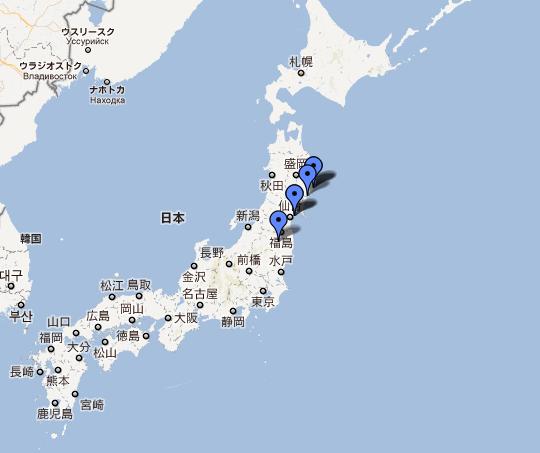ROAD vol.6 Evacuees' Short Comments | |
 Read the prologue to the evacuees' comments listed belowI’m a civil servant from Tokushima. I come here on 10-day rotations. It’s my first visit to the Tohoku area. People here at the evacuation center welcome us warmly, so I want to come back again. I usually stay here or go back to my accommodation in Matsushima. ( Man in his 30s, Ishinomaki, May 28th, 2011) I came from Tottori to volunteer. It took 16 hours by bus. I stay at this evacuation center to be able to provide support for 24 hours a day. I can take a bath only every other day. But the quantity of the meal service here is a lot, isn't it? It’s my first time receiving this ashiyu (foot bath) service. It’s making my whole body warm, and making me sleepy. (Woman in her 40s, Ishinomaki, May 28th, 2011) I’m always looking after other people here, so I’m happy to receive a service like this for a change. I am wearing this misanga, which the children gave me. I am happy that it is getting warmer these days.(Man in his 30s, Kesennuma, June 3rd, 2011) Many people stay in their homes and are socially withdrawn. I want them to have more contact with the volunteers coming from various areas. I try to get them to come out, but it’s difficult to do without a clear reason or opportunity. (Woman age unknown, Ishinomaki, June 3, 2011) We built a library that holds five thousand children’s books at Onagawa second elementary school. Please visit there to see them, if you can. I want not only children but also adults to see these picture books for their psychological care and healing. (Man in his 60s, Onagawa, June 4, 2011) Is it okay that I receive such a service even though I am a volunteer from Korea? When did ashiyu (footbath) start in Japan? This is quite nice! (Person in his/her 50s, Kesennuma, June 5, 2011) I’ve come from Tokyo to work as a volunteer. This is the first time for me to receive ashiyu, and it feels very nice. It feels especially good since I just finished giving other people massages. (Man in his 20s, Ishinomaki, June 15, 2011) I am a volunteer. Thank you for this ashiyu service. My house is located on a hill in Kesennuma, so it was safe. But I have nothing to do now. I was helping out at an evacuation shelter for one or two months, but not anymore. You come from Tokyo? A student? I’m impressed. Thank you for coming. (Man in his 70s, Kesennuma, June 26, 2011) This feels a lot better than it looks! (Man in his 30s, Kesennuma, July 8, 2011) I’m an evacuee myself, but I am volunteering at a café in Hall B. Today an aroma massage therapist came and gave us a massage. It felt good. I hate rain, though. The roof has been damaged by the earthquake and now it leaks when it rains. Every time it rains, I worry about the roof leaking again. But I rented an apartment. So I will leave this evacuation center soon. (Woman age unknown, Koriyama, July 9, 2011) (In response to the question, “To find a good time to come for this kind of volunteering is difficult, isn’t it?”) But I have found out that you had better go when you can. Most of the time, you just can’t go when you want to. I appreciate that my company allows us to go on leave for volunteer activities. (Man in his 30s, Kesennuma, July 15, 2011) There is no store in my neighbourhood. My motorcycle was swept away by the tsunami. Now, I go shopping by bike or my daughter takes me to some stores. (Woman in her 80s, temporary housing at Yamamoto) I lost my car in the tsunami, too, so I have to be given a ride by somebody who owns a car to go shopping. I can go shopping about twice a week that way. (Woman in her 80s, temporary housing at Rikuzentakata) I went shopping and have just come home. I have to go shopping to Ofunato because I can't get anything I want in my neighbourhood. It's inconvenient. Thankfully, a new supermarket is going to open nearby at the beginning of August. (Man in his 70s, temporary housing at Rikuzentakata) I had five cars, but they were all swept away by the tsunami. My son gave me a car, so now I can use that to go shopping. It still takes me thirty minutes to get to the shops, though. (Woman in her 60s, temporary housing at Rikuzentakata) I don't take a bus because the service is limited and I don’t know the time schedule. (Woman in her 80s, temporary housing at Rikuzentakata) |